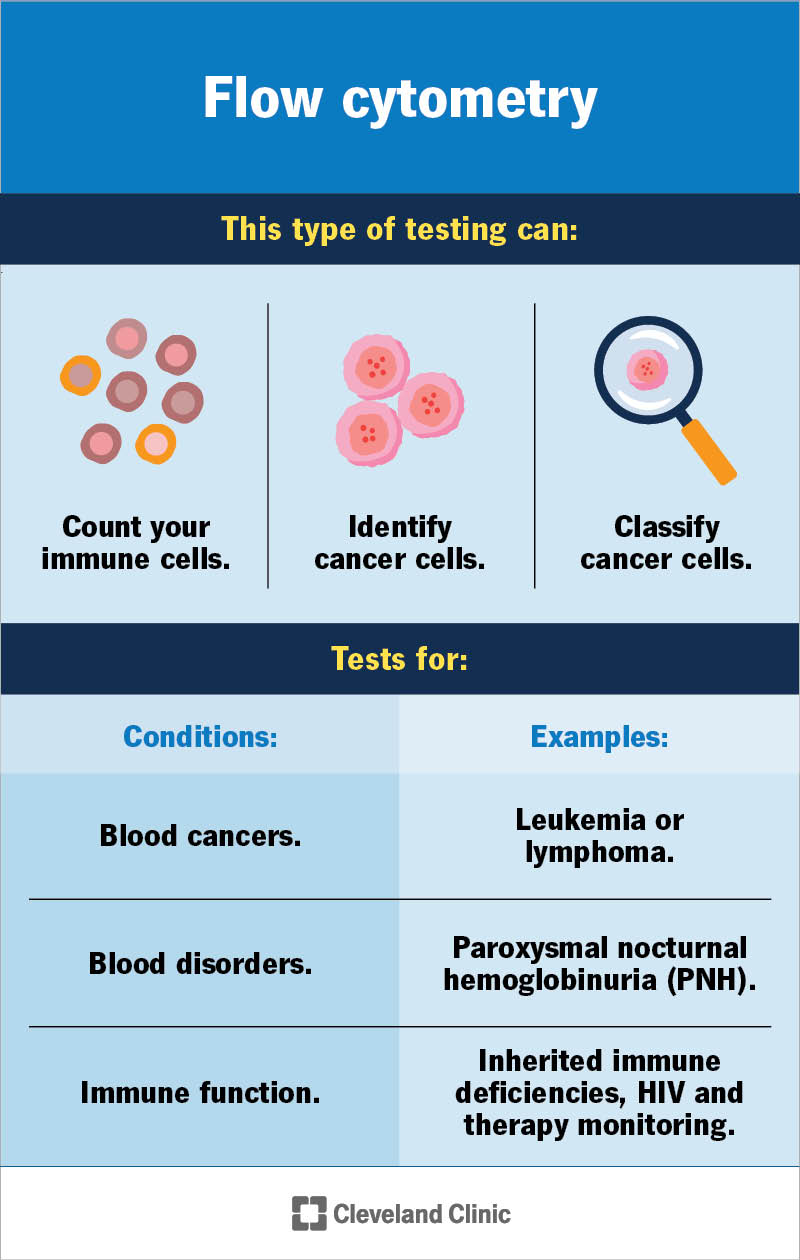Flow cytometry is a laser-based lab test that can detect chemical and physical differences of cells or particles. Healthcare providers commonly use it to evaluate bone marrow, peripheral blood and other fluids in your body. Flow cytometry can help diagnose several conditions, including infectious diseases and cancer.
Advertisement
Cleveland Clinic is a non-profit academic medical center. Advertising on our site helps support our mission. We do not endorse non-Cleveland Clinic products or services. Policy

Image content: This image is available to view online.
View image online (https://my.clevelandclinic.org/-/scassets/Images/org/health/articles/flow-cytometry)
Flow cytometry is a lab test used to analyze characteristics of cells or particles. During the process, a sample of cells or particles is first suspended in fluid. A lab technician treats the cells with fluorescent antibody dyes to label (or “tag”) specific proteins on the surface or inside of cells. This is called fluorescence-activated cell sorting (FACS). The cells are then injected into a flow cytometer machine. A computer can analyze and process approximately 10,000 cells in under a minute.
Advertisement
Cleveland Clinic is a non-profit academic medical center. Advertising on our site helps support our mission. We do not endorse non-Cleveland Clinic products or services. Policy
In medical settings, flow cytometry is used for:
Lab technicians do flow cytometry and pathologists interpret the results. To run the test, they need a sample of your blood, bone marrow, tissue or other body fluid. The healthcare provider who requests the test (like your primary care physician or oncologist) takes a sample and sends it to the pathology lab for testing.
Healthcare providers use flow cytometry whenever they need to learn more about the cells inside your body. This type of testing can check the number and types of immune cells and identify and characterize cancer cells. Researchers can use flow cytometry to learn more about the complexities of things like:
Advertisement
Healthcare providers may also do flow cytometry as a follow-up test after a complete blood count (CBC). This is especially true if initial testing shows an increased number of lymphocytes, abnormal cell counts or the presence of immature blood cells.
Healthcare providers also use flow cytometry to diagnose and treat cancer. It can help predict how aggressive the disease will be and determine if the cancer will respond to certain treatments. It can also tell you if cancer has relapsed (returned) after treatment.
Flow cytometry rapidly analyzes physical and chemical properties of cells and particles. Here’s how it works:
Unless your healthcare provider gives you specific instructions, there’s usually no need to prepare before a flow cytometry test.
Your provider will need a blood, tissue or bone marrow sample. They can collect this during an appointment at their office. Once they have the sample, they’ll send it to a lab for testing.
Once the pathologist completes your flow cytometry test, they’ll analyze the data and send a report to your provider who ordered the test.
There are no known risks to having a flow cytometry test.
It can take several days to a week to get your flow cytometry results, depending on the lab your healthcare provider uses.
The pathologist will look at the markers (antigens) on your cells. A healthy cell will have an antigen pattern that matches the type and maturity of the cell. An abnormal cell will show different patterns that could point to the presence of leukemia, lymphoma or other diseases.
When your provider receives your results, they’ll review the pathologist’s lab report, which is a summary of the raw data that they reviewed from the flow cytometer computer.
When interpreting your flow cytometry results, they’ll consider your symptoms, health history and most recent physical exam. They’ll share the results with you and help you understand what they mean. They’ll also use that information to determine your next steps.
Advertisement
Abnormal results could point to conditions like:
Your healthcare provider will talk with you about your flow cytometry results and possible treatment options. Your test results can tell your provider how aggressive your condition is, whether a certain treatment will work and how likely your condition is to relapse once you complete treatment. They’ll consider all these factors when coming up with a potential treatment plan.
It can take some time to diagnose certain conditions. If you’ve been through a lot of testing but still need answers, you might wonder how another test will make any difference. But flow cytometry can give your healthcare provider invaluable information about the cells inside your body. In addition to helping your provider diagnose your condition, flow cytometry can also help your provider create a personalized treatment plan.
Advertisement

Sign up for our Health Essentials emails for expert guidance on nutrition, fitness, sleep, skin care and more.
Learn more about the Health Library and our editorial process.
Cleveland Clinic’s health articles are based on evidence-backed information and review by medical professionals to ensure accuracy, reliability and up-to-date clinical standards.
Cleveland Clinic’s health articles are based on evidence-backed information and review by medical professionals to ensure accuracy, reliability and up-to-date clinical standards.
Cleveland Clinic’s primary care providers offer lifelong medical care. From sinus infections and high blood pressure to preventive screening, we’re here for you.
